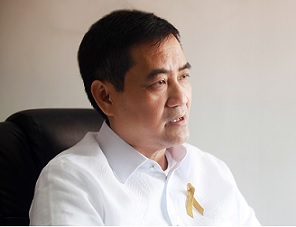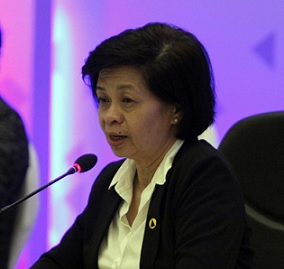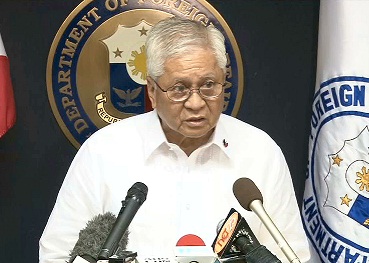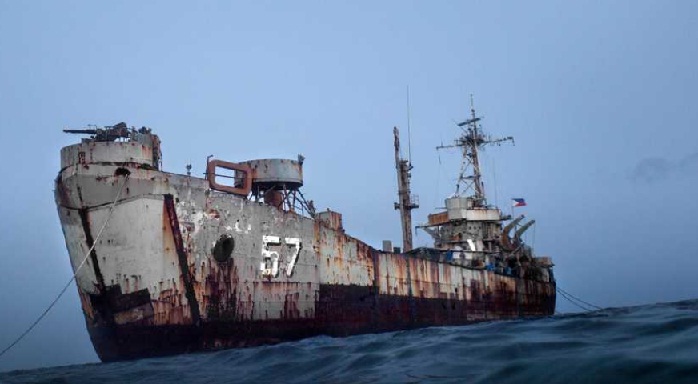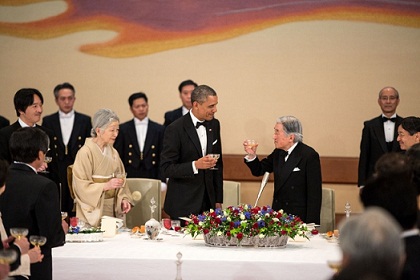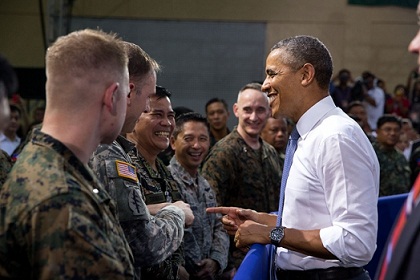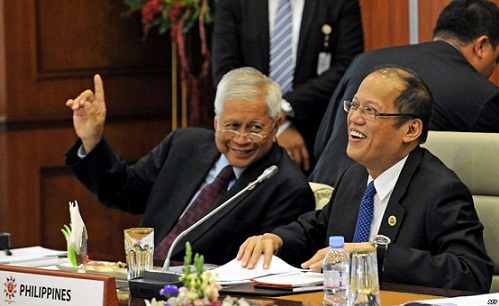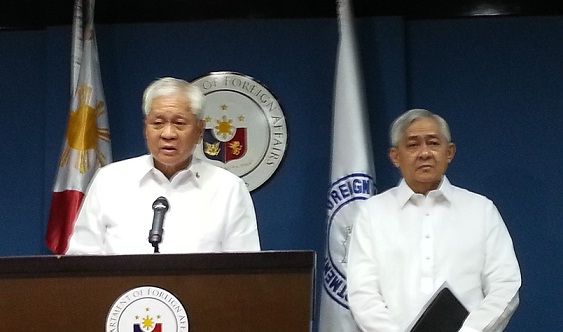
Foreign Secretary Albert del Rosario and Solicitor General Francis Jardeleza.
The Philippines submitted its Memorial before the Arbitral Tribunal of the United Nations Convention on the Law of the Sea in The Hague, Netherlands in the suit it filed to nullify China’s 9-dash line map, Foreign Secretary Albert del Rosario said today.
China’s reaction: http://www.fmprc.gov.cn/eng/xwfw/s2510/t1142356.shtml
Del Rosario said the 4,000 page Memorial consisting of 10 volumes “demonstrates that the Arbitral Tribunal has jurisdiction “over the case and that every claim in the Statement of Claim filed on Jan. 22, 2013 “is meritorious.”
China’s 9-dash line map covers almost the whole of South China Sea and encroaches on several parts of Philippine territory.
Solicitor General Francis Jardeleza said they have included Ayungin shoal in the amended Statement of claim. “The Ayungin shoal is within the 200 nautical mile Economic Exclusive Zone of the Philippines and the position of the Philippine government is that the Philippines has sovereign rights and jurisdiction.”
Jardeleza declined to say if the blocking of civilian ships bringing supplies to BRP Sierra Madre grounded in Ayungin Shoal last week is cited in the Memorial.
Jardeleza said the Memorial was submitted this morning electronically to the UN Arbitral Court and the Philippine Ambassador to The Hague Jaime Victor Ledda will submit the printed copies tomorrow.
Following is the full statement of the Del Rosario:
Thank you everyone for your presence here on a Sunday.
Today, the Philippines submitted its Memorial to the Arbitral Tribunal that is hearing the case it brought against the People’s Republic of China under the United Nations Convention on the Law of the Sea in January 2013.
The Philippines’ Memorial was submitted in conformity with the Rules of Procedure adopted by the five-member Arbitral Tribunal last August, which established 30 March 2014 as the due date for its submission.
The Memorial presents the Philippines’ case on the jurisdiction of the Arbitral Tribunal and the merits of its claims. It consists of ten volumes. Volume I, which is 270 pages in length, contains the Philippines’ analysis of the applicable law and the relevant evidence, and demonstrates that the Arbitral Tribunal has jurisdiction over all of the claims made by the Philippines’ in its Statement of Claim, and that every claim is meritorious. It sets out the specific relief sought by the Philippines in regard to each of its claims, and shows why it is entitled to such relief.
Volumes II through X contain the documentary evidence and maps that support the Philippines’ claims, all of which are cited in Volume I. Volumes II through X consist of more than 3,700 pages, including more than 40 maps, for a total submission of nearly 4,000 pages.
The Memorial is the result of an enormous, collaborative effort by the extremely capable and dedicated legal team that has been serving the Philippines in this important case, headed by Solicitor General Francis Jardeleza and a team of lawyers from various agencies, including the OSG, DFA, DOJ, and the Office of the President.
I also wish to thank other government agencies for their invaluable contribution in the generation of documents including:
• The Department of Justice (DOJ);
• The Department of National Defense (DND), particularly the Armed Forces of the Philippines (AFP), Philippine Navy, and Philippine Air Force (PAF) ;
• The Department of Transportation and Communications, particularly the Philippine Coast Guard (PCG);
• The Department of Environment and Natural Resources, specifically the National Mapping and Resource Information Authority (NAMRIA);
• The Department of Energy (DOE);
• The Bureau of Fisheries and Aquatic Resources (BFAR);
• The Foreign Service Institute (FSI);
• And other agencies such as National Museum, National Historical Commission, National Archives, DILG’s Philippine National Police, Municipality of Kalayaan, and the UP Marine Science Institute.
We are also most grateful to our international legal advisers led by Paul Reichler and his team of international lawyers, including Mr. Lawrence H. Martin, Professor Bernard H. Oxman, Professor Philippe Sands, and Professor Alan Boyle for their invaluable guidance and assistance.
Ordinarily, the next step in an arbitration of this nature would be the filing of a Counter-Memorial by the other Party. However, it is currently unknown whether China will appear in the case, or whether it will continue its present policy of abstaining from the proceedings. Under the Rules of Procedure, the Arbitral Tribunal will decide on next steps and advise the Parties.
The Philippines will follow the guidance of the Arbitral Tribunal in regard to the publication of the Memorial. In the meantime, out of respect for the Tribunal and the arbitral process, it is obliged to preserve confidentiality.
With firm conviction, the ultimate purpose of the Memorial is our national interest.
It is about defending what is legitimately ours.
It is about securing our children’s future.
It is about guaranteeing freedom of navigation for all nations.
It is about helping to preserve regional peace, security and stability.
And finally, it is about seeking not just any kind of resolution but a just and durable solution grounded on International Law.
Thank you very much indeed for your kind attention.
Following is the Question and Answer with Jardeleza:
Q & A during the Press Conference on the Submission of the Memorial to the Arbitral Tribunal
On Ayungin issue being included in the memorial:
Yes earlier last month the PH amended its statement of claim to include Ayungin shoal as one of the items subject of the claim in the arbitration. (what are those about the Ayungin shoal included in the memorial?) similar to the claims we have earlier made, the Ayungin shoal is within the 200NM EEZ of the PH and the position of the PH govt is that PH has sovereign rights and jurisdiction. (what about the blocking of PH ships incident?) beyond confirming to you that we have included Ayungin shoal I beg not to comment further until the memorial is made public by the tribunal.
On similar jurisprudence by the tribunal on this case:
Well we have cited in the memorial all of the relevant jurisprudence cases in support of our case. (were there similar incidents before?) again beyond confirming that we cite jurisprudence we will await for the tribunal to disclose the contents of the memorial (how long will it take for them to release the details of the memorial?) no, we will be guided by the good discretion of the tribunal.
On the end goal of tribunal declaring it has jurisdiction over the case:
Yes, the memorial covers both matter of jurisdiction and matters on the merits all at the same time in accordance with the directive of the tribunal so we were ordered to discuss both jurisdiction and merits all at the same time in the memorial (?) again we will wait the guidance of the tribunal how they wish to go forward
On the time frame for tribunal to hand down its ruling & enforceability of the decision on China:
Well first we cannot speculate on the time table that the tribunal will give us I think on the question on what if the PH gets a favorable ruling, the PH has always taken a position that a favorable ruling is a ruling that China as a member of the community of nations is bound legally to accept and implement.
On when the tribunal approves the publication of the memorial, what is next step after this memorial:
Again we will have to wait for the discretion of the tribunal. They will be giving us directions on the next steps (will they ask China to comment on this memorial?) we will have to wait what the tribunal will say.
On what factors can derail the case:
Well we hope there are no factors that will derail our case and we hope that we can get a favorable decision the soonest.
On including an application for provisional measures:
Again I beg to decline top answer there will be a time that we can discuss to you the contents of the memorial.
On other claimants joining the case, how will the case pave the way for other claimants to do the same:
We continue to hope that our neighboring countries who have similar stakes in the SCS will take a position similar to us.
On furnishing ASEAN countries basic info on the memorial:
No the memorial is confidential until we get guidance from the tribunal.
(VERA Files is put out by veteran journalists taking a deeper look at current issues. Vera is Latin for “true.”)
